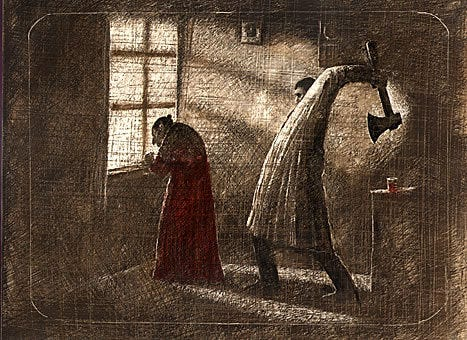[Literature Reflection] Crime and Punishment: Love Conquers All
- mariakang07
.jpeg/v1/fill/w_320,h_320/file.jpg)
- 2024년 9월 10일
- 3분 분량
Throughout history, men have endlessly pursued to free themselves from mental torment. Men have developed various remedies to cure their broken souls, soothe their guilt, and fill their emptiness. Whether they chose hopeless existentialism, practical utilitarianism, insatiable imperialism, or whatever initial consolation, men came up with numerous philosophies and implications to ease their torment. While those novel and complicated theories were being accepted, the “conventional” virtues were overlooked by many. Yet some still portray love and devotion as the comforter of men’s torment. In Russian author, Fyodor Dostoyevsky’s book, a mentally unstable and distressed sinner, Raskolnikov, strives to ease his guilt and torment and is salvaged through the devotion of his companion, Sonya. In his book Crime and Punishment, Dostoyevsky reveals that love and devotion can solely save men from their torment.
Raskolnikov, as an impoverished, unstable, but intelligent individual, seeks to ease his torment through murder and narcissistic delusion. He does not find himself fit among the “ordinary” people and believes he is somewhat superior than them. Raskolnikov explains and justifies his torments by saying: “Pain and suffering are inevitable for persons of broad awareness and depth of heart. The truly great are, in my view, always bound to feel a great sense of sadness during their time upon earth” (315). With his arrogant delusion of himself, he isolates and elevates himself from humanity, causing even more torment and discrepancy. He commits murder because of his empty narcissistic delusion as he reveals to Sonya, a faithful, upright, but impoverished prostitute: “You see, I wanted to become a Napoleon, and that’s why I killed” (495). He exhibits the empty and delusional impulse that caused him to murder the pawnbroker. Yet at the same time, he is aware that he is only a villain and that his heartlessness cannot fill his emptiness.
Sonya, knowing Raskolnikov’s guilt and pain, urges Raskolnikov to lay his burden on the cross and confess his crime. Though Raskolnikov does not comprehend Sonya’s devotion, Sonya cries for him, hands him a crucifix, and secretly follows him on his reluctant pilgrimage to public confession. When Raskolnikov was about to retreat from this only way to ease his guilt, he discovered Sonya following her and “understood at that moment, once and for all, that Sonya was now with him forever and would follow him even to the ends over” (627). Thus, Raskolnikov heads to the police station and confesses his crime. Although he voluntarily met the consequence he dreaded throughout, his endless guilty torments diminished, and the conscience’s punishment was over. He acknowledged the boundless devotion of Sonya, and Sonya was on his side to persevere through all hardships with him. Raskonikov’s salvation by Sonya portrays the potency of love in salvaging the tormented man.
In the prison, Raskolnikov is finally renewed and his soul is salvaged by the affectionate devotion of Sonya. At first, Raskolnikov maintains his callous narcissism and does not truly repent his sin. Yet Sonya, with perseverance and love, visits him every day in his prison, and Raskolnikov starts to change. One day, Sonya notices that Raskolnikov has learned love in her and that he is salvaged from his emptiness: “Her eyes began to shine with an infinite happiness; she had understood, and now she was in no doubt that he loved her, loved her infinitely, and that at last, it had arrived, that moment…” (655). Raskolnikov embraces Sonya’s knees, and, for the first time, experiences love. Sonya’s devotion had overcome Raskolnikov’s narcissism and filled the emptiness with the virtue of love. Although Raskolnikov’s genuine renewal was not assured, his acknowledgment of love from Sonya illustrates the superiority of love and devotion.
Fyodor Dostoyevsky reveals that love and devotion can salvage men out of their emptiness and torment through his book Crime and Punishment. Raskolnikov, a narcissistic and delusional nihilist, torments himself with the discrepancy of his guilt and narcissism. Yet Sonya, an equally impoverished and hopeless but faithful woman, devotes herself to rescuing him. With her endless efforts to lead him the right way, Raskolnikov finally understands love and starts to hope for his future with her. Raskolnikov was a nihilist, a murderer, a narcissist, and an incompetent human being; only through Sonya’s endless effort was he recovered from his guilt. Similarly, many seek to ease their torment with ephemeral values: they pursue money, ideology, pleasure, or whatever seems plausible at the moment. Nevertheless, as Dostoyevsky illustrates, men are saved and changed only with the devotion of others which they can learn from. Though it may seem meek, love conquers all.

![[Literature Reflection] The Brothers Karamazov: Response to the Theological Challenge from Ivan's "Grand Inquisitor"](https://static.wixstatic.com/media/d7e36d_14229c009fc44f58a7c098ff1e332e1b~mv2.png/v1/fill/w_620,h_465,al_c,q_85,enc_avif,quality_auto/d7e36d_14229c009fc44f58a7c098ff1e332e1b~mv2.png)
![[Literature Reflection] Aeneas' Leaderhip](https://static.wixstatic.com/media/d7e36d_fecffdb951c2447d86588e48531fd179~mv2.png/v1/fill/w_980,h_691,al_c,q_90,usm_0.66_1.00_0.01,enc_avif,quality_auto/d7e36d_fecffdb951c2447d86588e48531fd179~mv2.png)
![[Literature Reflection] The Brother of Karamazov: Does God Exist?](https://static.wixstatic.com/media/d7e36d_5a63def0e6994e7184a80db456bd0dda~mv2.png/v1/fill/w_649,h_511,al_c,q_85,enc_avif,quality_auto/d7e36d_5a63def0e6994e7184a80db456bd0dda~mv2.png)
댓글